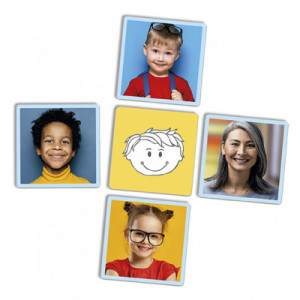Emotions
Learning to reason, solving mathematical problems, or writing without spelling mistakes are very important skills that we must stimulate and promote in our children. But we must not forget a fundamental part of their development: understanding and knowing how to manage their own emotions.
Knowing what the basic emotions and their names are, how each emotion makes us feel or with what gestures we express them is a very important and useful learning in our lives.
With the following games you will be able to work in different ways emotions from very early ages.

Learning to develop empathy
When we are young, learning to look closely at the details of what surrounds us is a process that requires training.
Similarly, listening attentively, developing a sense of smell or learning to discriminate through touch are trainable skills that improve with experience, as are recognizing moods and emotional states in ourselves and others.
In this section you will find specific games for children to learn to manage their own emotions and to recognize those of others, developing empathy and using their five senses, especially sight, with the recognition of facial expressions of those around them.
They are games that can help a lot when there is a child with a disability in a classroom, because peers will understand better the difficulties they have to go through in order to reach the same goal as them. We are referring above all to hearing and visual disabilities.
How to recognize your own emotions and those of others
The development of empathy and the management of our own emotions and those that we perceive in others is a process that begins in childhood, but continues throughout life. Not everyone has the same ease of understanding how others feel about a particular situation, just as some people find it very easy to verbalize everything they think and feel, while others find it difficult to understand what they are feeling and thinking, while others find it difficult to understand what they are thinking and feeling.
With the games specially designed for managing emotions that you will find in the Akros store, it will be much easier for you to help your children or students to verbalize their feelings and to put themselves in the shoes of their peers when they do the same.
Among others, you can find games to recognize facial expressions, joining them to a specific emotion, puppets of emotions, puzzles or maxi seals, among other materials that will allow you to guide the child in the process of self-learning that involves learning to recognize and manage your own feelings and those of people around us.


















